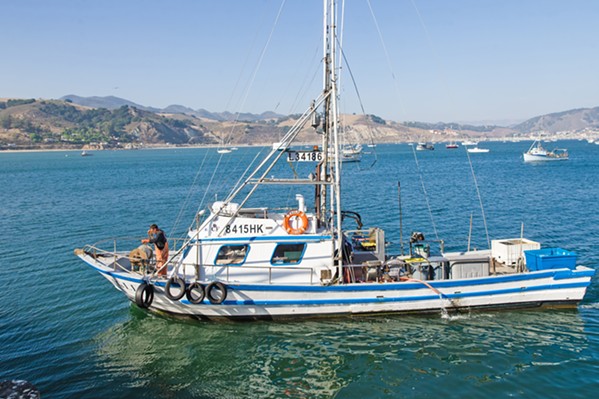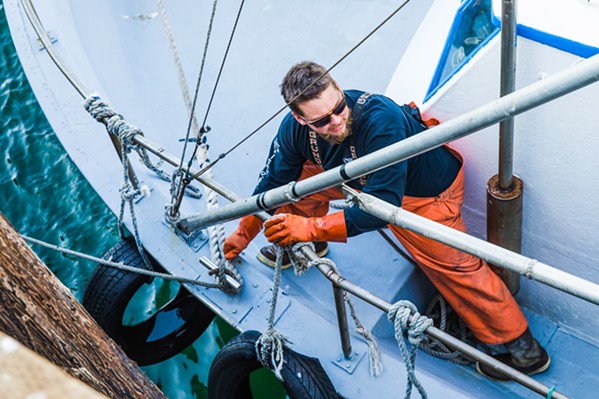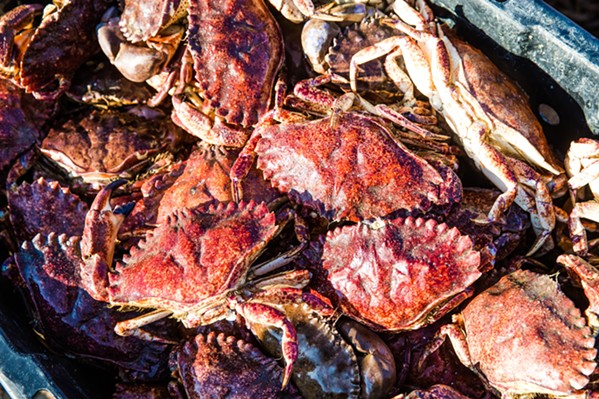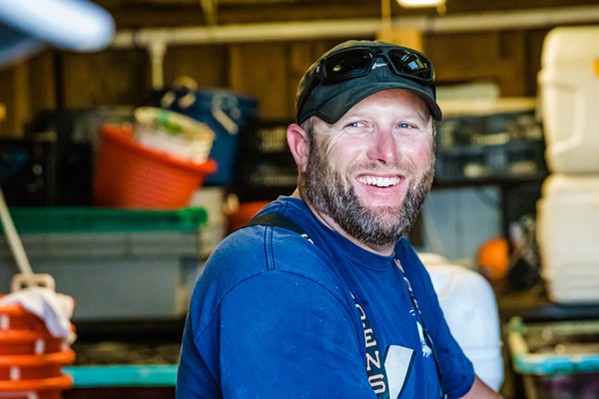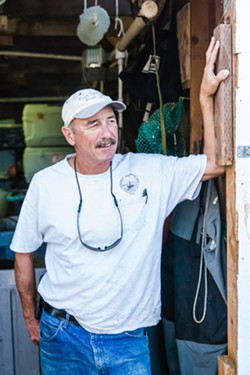[{
"name": "Ad - Medium Rectangle CC01 - 300x250",
"id": "AdMediumRectangleCC01300x250",
"class": "inlineCenter",
"insertPoint": "8",
"component": "2963441",
"requiredCountToDisplay": "12"
},{
"name": "Ad - Medium Rectangle LC01 - 300x250",
"id": "AdMediumRectangleCC01300x250",
"class": "inlineCenter",
"insertPoint": "18",
"component": "2963441",
"requiredCountToDisplay": "22"
},{
"name": "Ad - Medium Rectangle LC09 - 300x250",
"id": "AdMediumRectangleLC09300x250",
"class": "inlineCenter",
"insertPoint": "28",
"component": "3252660",
"requiredCountToDisplay": "32"
}]
We've all heard the complaints about commercial fishing: It's unsustainable, its practices are cruel, and it's ecologically damaging. Online, we can see horrible images of shark finning or clubbing seals or slaughtering whales. It's easy to believe that commercial fishing is bad. But is it?
People for the Ethical Treatment of Animals (PETA), the California Fisheries Fund, the Moore Foundation, the Pacific Fisheries Information Network, the National Ocean Economics Program, the Pacific Fishery Management Council, and the Resource Legacy Fishery Fund are just a few of the many groups watch-dogging the commercial fishing industry, not to mention government oversight groups such as California's Fish and Game Commission, the Department of Fish and Wildlife, the California State Coastal Conservancy, and the Ocean Protection Council, plus federal oversight groups such as the National Marine Fisheries Service and Sea Grant.
That's a lot of eyes scrutinizing fishermen's every move, and every commercial fisherman has to operate knowing their every practice will be examined. Over the years, formerly common fishing practices have been banned, fishing grounds have gained protected status, and increased regulations have made commercial fishing more difficult and less viable. Most of us will never know the day-to-day grind of the industry, but one local fishing team offered their point of view of the job they love.
The newbie
Justin Jewell saw the advertisement on Craigslist: Deckhand wanted, commercial fishing boat. Jewell, a lifelong surfer and former national team water polo player, always loved the sea and was looking for a more physical job. He'd been working retail ever since recovering from a broken back, sustained in a house fire in Indonesia, where he'd been surfing and doing surf photography. He thought, commercial fishing? Why not? He called the number.
"For deckhands, you're basically given a shot," Jewell said. "You show up, go out, and the captain keeps you as long as you're beneficial."
Jewell's first job was a trip to Half Moon Bay. He spent $500 getting what he needed (a fishing license, slickers, gloves, boots, a knife), got a good night's sleep, woke up the next day at 3:30 a.m., and headed out.
"It was a two-day trip, my first time staying on a boat," Jewell recalled. "My excitement level was through the roof. The first day went by pretty smoothly. We were cleaning lines and buoys, something you rarely do, but I didn't know it at the time."
Think of it as a trial by fire, a way for a captain to weed out the doers from the slackers. By the second day, it wasn't quite as exciting.
"Waking up the next day at 4 a.m. on the boat, there are no comforts, no showers, no privacy," Jewell remembered. "I put on some new socks and went about getting bait ready for that day. It hit me how thankful I was it was only a two-day trip."
Jewell, 38, has been fishing for less than a year, but he's stayed with it when a lot of deckhand tryouts don't. It sounds great at first. Who doesn't love fishing? Going out on a boat and being outside? Commercial fishing isn't kick-back-in-a-boat-with-a-beer kind of fishing. It's tough, physically demanding work, often in harsh weather conditions. Some deckhand tryouts get seasick, others can't stand the smell, and some get grossed out by cutting bait all day. It's not for wussies.
Jewell, who's now a crab fisherman on Capt. Michael Cohen's 47-foot crab and salmon boat, Eagle, out of Port San Luis, thinks he has it pretty easy these days. He started fishing slime eels, sometimes called hagfish because it sounds a lot less disgusting. Trapped live, the eels are shipped to Korea, where they're considered a delicacy. For the last six months, he's been crabbing with Cohen.
Dungeness crabs are crab fishermen's best catch, but they're seasonal, so until the fishery reopens on Nov. 15, Jewell and Cohen are catching rock crabs, which are fair game year-round. It's hard work. They're usually on the boat by 5 a.m. and headed out to their strings of crab pots, and after working for 12 hours or so, they head back to port, unload, clean the boat, and prep it for the next trip.
"One thing I didn't realize when I started was there are no lunch breaks. The boat doesn't stop," Jewell noted. "You basically need to schedule when you're going to eat, going to get a drink of water, going to use the bathroom—or what we call 'the head'—driving between strings, which is maybe five or 10 minutes."
There are somewhere around 20 pots on a string, and each one needs to be hauled aboard, sorted—returning to the sea the wrong species, pregnant crabs, undersized crabs, etc.—before re-baiting and returning it to the bottom. Even using a hydraulic hoist, the work is exhausting.
"Crabber claw—honestly I'm just now getting over it. It lasts two to three months of every season where your hands sort of cramp-up from grabbing the pots, grabbing the lines, pushing and pulling on things. All the muscles and tendons in your hands get sore and conform to this crablike shape," Jewell explained, holding out his hands into two claw-like appendages.
Currently, he and Cohen are running about 200 rock crab pots and check them about twice a week. If they're doing well, they leave them where they are. If they aren't, they have to move them, which is labor intensive. When Dungeness season starts, they'll have more like 250 pots, which Jewell says is "probably the most two men can do in a day." The big difference is they'll be checking them about five times a week.
Usually deckhands get a percentage of the day's catch—good days they'll make more money; bad days less—so adding another deckhand is a financial calculation for a captain. Cohen may be able to add more strings of pots and make more money with another deckhand, or maybe not. He's still the one paying for boat upkeep, fuel, and bait.
When you're the only deckhand, calling in sick or deciding you don't feel like working that day isn't an option—not if you want to keep your job.
"The most important thing for me is to physically stay healthy," Jewell admitted. "I've got to put the right kind of fuel in my tank. If I drink a Coke the day before fishing, I end up with acid reflux the next day. When I wake up and I'm not feeling 100 percent, it can really push you mentally and physically."
An industry adapts
Jewell's captain, Cohen, 40, is sort of Port San Luis royalty. His father Barry Cohen built Olde Port Inn board by board, working with Leo Brisco, of Brisco Road fame, to develop Port San Luis into a functioning commercial fishing port. Michael's older brother is Leonard Cohen, who used to own Olde Port Inn but now owns seafood-centric restaurants Ciopinot Seafood Grille and La Esquina Taqueria in San Luis Obispo.
Michael Cohen is the first to admit that commercial fishing isn't "for everybody." He started in 1996 at age 18, eventually buying his own salmon boat before upgrading to Eagle. He also brought and ran the fish market on the pier but has since sold it. He and Howie Kennett still run an icehouse on the pier. With 22 years of experience, Cohen's seen the local industry go through good times and bad, and right now he says it's going "good" (not great) for him.
Of course, competition isn't what it used to be. Cohen recalls his early days, when Port San Luis had a lot more vessels, many of which were trawlers, dragging huge nets along the bottom.
"We had a different fleet here," Cohen noted, and between government agencies and environmental groups, the local fishing industry was under attack.
"The government did a big buyback program of trawler permits because of outcry from environmental groups to get rid of dragging," Cohen said. "It was an era where a lot of the older guys were getting ready to retire, so they sold their permits back to the government. Then, the Nature Conservancy did a buyback of their own and bought more guys out. Avila lost its fish processing facilities and a bunch of boats disappeared all at the same time, so there was a real slump for a while. Guys started buying smaller boats and doing hook-and-line and trap fishing, and boats from other ports stopped coming here. When I started fishing, I never thought I'd be a crabber."
In Cohen's assessment, the local industry's slump was the result of a kind of catch-22 paradox. Trawlers had very specific catch limits, and going over those quotas resulted in big fines. Since there was no way to weigh the catch onboard a boat, fishermen had to guesstimate their haul, and it was better to underestimate than over estimate.
"Check this out," Cohen said. "Let's say 'species A' had a 10,000-pound limit on a dragger. Fishermen would get maybe 8,500 pounds and stop to avoid a fine. Scientists would look at the catch [tallies] and say, 'Oh, they only brought in 8,500 pounds, so that fish stock must be low, so we better drop the limit to 8,000 pounds.' It looked bad even though fish stocks were up!"
Add to that environmentalists who claimed dragging devastated the sea floor. Fishermen like Cohen have a different take.
"The industry did a lot of studies, including video studies, which proved that dragging didn't do as much damage as environmentalists thought it did," Cohen claimed. "We had divers on the bottom, and the nets rolled right over them. Video showed fish going in and out of the nets almost like they didn't care. The fish thought of it as a structure to hang out in. The environmentalists didn't want to see the facts. They're emotionally driven people."
Healthy seas
According to Cohen, fish stocks are much more healthy than many believe, and trawling actually had a lot of benefits.
"The nets were stirring up nutrients on the bottom, attracting more fish," he said. "We'd trawl an area and get a great catch and go back and there'd be even more fish. Of course, there're also phenomenon we can't account for. In 1995, fishermen were being accused of raping the ocean, and out of nowhere came a huge horde of rockfish that showed up along the coast. You couldn't get away from them. They were everywhere for a couple months, and then they were gone overnight."
Lobbying the government about their faulty catch assessment figures went nowhere, Cohen said.
"I went to a few meetings but they were so boring I fell asleep," Cohen admitted. "My dad did a lot of fighting, and Ray Hilborn, a professor up in Washington [in the U of W's School of Aquatic and Fishery Sciences], who I believe taught classes about stock assessment and regulation, came down and told government regulators, 'You're doing the exact opposite of what I teach my students.'"
Trawling is now gone from the Central Coast, all the permits bought up by the government and environmental groups. Has that taken the pressure off local fishermen from environmentalists?
"The environmental groups never go away," Cohen said. "They're constantly pecking away all the time, and once they get their way on one thing they move onto the next. They're now trying to regulate the dungeness crab fishery, which is really idiotic. The way we fish dungeness is already sustainable, and the industry does a great job regulating itself. We already can't take any females or small males."
The current complaint among environmental groups is over vertical lines in the ocean, which crab pots obviously require. The worry is whale entanglement, which in his 22 years fishing, Cohen has only heard of one instance of firsthand. Thanks to protections put in place since the 1970s, the whale population has boomed. If entanglement was an ongoing problem, Cohen would expect to see a lot more of it.
He'd heard about a year that had high numbers of entanglements, but the whales were found to have elevated levels of domoic acid, often caused by red tide, which can lead to disorientation in whales who consume tainted fish. A blue whale can eat close to 8,000 pounds of krill per day, and if it's full of domoic acid, navigation can be affected.
"A lot of environmentalists want to paint fishermen as bad people, but it's in our interests to keep our environment and fisheries healthy," Cohen said. "I'm an environmentalist myself. When I find a female tock crab with eggs, I throw it back even though I don't have to. If we're getting a lot of small fish bycatch, we stop and go somewhere else. Environmentalism is all money driven. Groups get money from donors, so they need to create an issue—there's no reason to donate money if there's no emergency."
California has perhaps the most regulated fishing industry in the world. Marine Protection Areas, quotas, seasons, and equipment—it's all regulated.
"People think we're like Vikings raping and pillaging the ocean, but we want to do this job forever, and we can't if we don't keep our fisheries healthy," Cohen said. "If [hardened environmentalists] were paying attention to reason and really did their research, they'd have a whole different attitude. If I was talking to the average person on the street, I'd tell them, 'Use your head. Don't get brainwashed by people who don't know what they're talking about.'"
Day's end
Jewell, standing on the deck of Eagle, attaches cables to big black boxes full of live rock crab, and dockworker Howie Kennett operates the hoist, pulling them up to Olde Port pier, where Cohen guides them onto pallets, where they'll be forklifted on to scales, weighed, and tallied before being dumped into huge saltwater cisterns, awaiting shipment to local restaurants.
Today Cohen and Jewell have brought in 10 boxes of rock crab and one box of conch. Both men are tired but happy. It wasn't a stellar catch, but it was pretty good, and there are smiles all around.
At one time, this old pier might have been crowded with unloading fishing vessels, but today it's just Cohen's boat. Whether one or many, Kennett will be here every day, seven days a week, to help fishermen unload the day's catch. He clearly likes his job, but like a lot of these hardened men of the sea, he makes fun of the hardscrabble fisherman lifestyle.
"Port San Luis is the lowest point at the end of the road where debris meets the sea," he jokes. He, Cohen, and Jewell wouldn't have it any other way. The next time you crack open a freshly boiled crab claw, maybe think about them. Δ
You can reach Senior Staff Writer Glen Starkey at [email protected].
Latest in News
Comments (6)
Showing 1-6 of 6
Readers also liked…
-

Coast Unified teachers upset over new position's salary and qualifications
Oct 20, 2022 -

SLO police identify alleged driver who hit and killed couple
Dec 22, 2022 -

When the levee breaks: Oceano residents, county officials walk a tightrope of regulations to manage Arroyo Grande Creek, which some say led to the levee's failure in January
May 18, 2023

